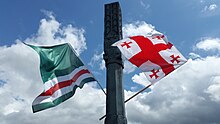|
Pankisi
Pankisi (Georgian: პანკისი) or the Pankisi Gorge (Georgian: პანკისის ხეობა, Pankisis Kheoba)[a] is a valley region in Georgia, in the upper reaches of River Alazani just south of Georgia’s historic region of Tusheti between Mt Borbalo and the ruined 17th-century fortress of Bakhtrioni. Administratively, it is included in the Akhmeta municipality of the Kakheti region. An ethnic group called Kists of Chechen roots form the majority (75%) in the area.[citation needed] History17th century geographer and historian prince Vakhushti Bagrationi in his book "Description of Kingdom of Georgia" writes that the inhabitants of Pankisi are Georgian nobility with titles of Aznauri and Tavadi who have buildings near the mountains.[1] He also writes: "The village of Pankisi has vineyards, fruits and gardens, and mountain foods, like the places of mountains. Fish - trout, the forest is full of animals, land fertile for the grain, also for rice and cotton. A lots of cattle and a lot of pigs."[1] In the legislative acts of Georgian law of the 18th century, the noble (Aznauri) Kobiashvili family of the Kingdom of Kakheti are mentioned as the lords of the Pankisi valley.[2][3] According to sources, in 1730s, the Pankisi valley was emptied of Georgian population: part of them were killed as a result of the invasions, and rest of them resettled elsewhere.[4] EtymologyAccording to M. Albutashvili (also known as Kisti Chobani) toponym Pankisi is of Georgian origin, according to him, Pankisi derives from Pantisi which means land rich in wild forest pears (P’ant’a-პანტა) (pyrus caucasica) with Georgian suffix -სი(si).[5][4] Political situation It had allegedly often been used as a base for transit, training and shipments of arms and financing by Chechen rebels and Islamic militants, including foreign fighters, many of whom followed Ruslan Gelayev.[6] Most of these accusations were around 2002, but others allege that it is more peaceful now,[7] although there are still many Chechen refugees living there.[8] The former senior Islamic State leader Tarkan Batirashvili, otherwise known as "Omar the Chechen", grew up in the area where some of his family still lives.[9] In 2014, Batirashvilii reportedly threatened to return to the area to lead a Muslim attack on Russian Chechnya.[10] However, such a threat never came into fruition as he was killed during a battle in the town of Al-Shirqat in Iraq of 2016. Cultural referencesThe situation in the Pankisi Gorge received an extensive fictional treatment factoring into several of the popular John Ringo anti-terrorism military science fiction books in the Paladin of Shadows series. NotesReferences
Bibliography
External links
|
||||||||||||

